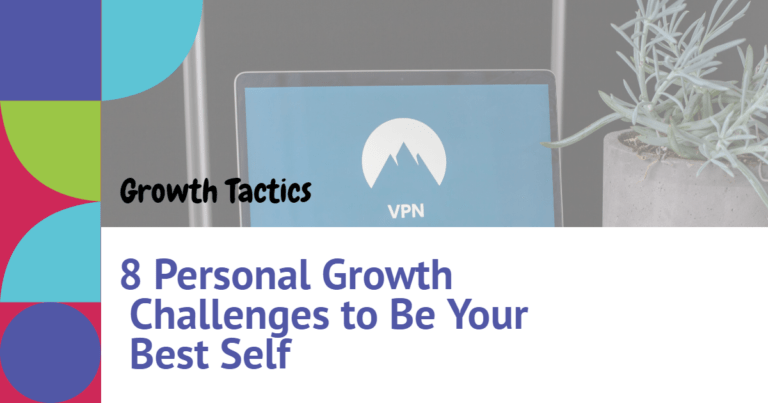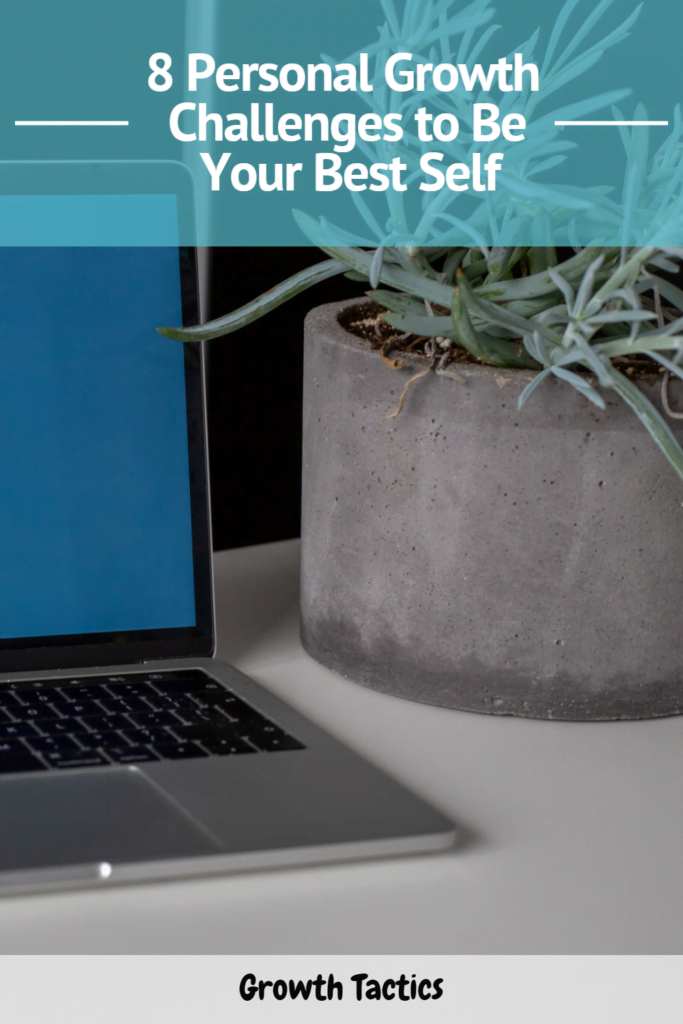Personal growth challenges are tasks or activities that push you out of your comfort zone to develop new skills and perspectives. Taking on challenges is an excellent way to promote self-improvement because it forces you to step outside your normal routine.
A personal growth challenge could involve learning something new, changing your habits, expanding your mindset, or gaining life experience. The idea is that the challenge takes effort and commitment, but is also achievable if you stay motivated. These self-growth challenges help you become a better version of yourself.
Many people find it useful to take on a 30-day challenge, committing to something new for 30 consecutive days. The defined timeframe and daily repetition help you turn a challenge into a habit. 30-day challenges build self-confidence as you prove to yourself that you can successfully tackle difficult tasks.
Some examples of 30-day challenges include waking up an hour earlier, reading 30 minutes a day, completing a 5K run, or learning a new language. The challenge could be small or large, but it should push you just beyond your current abilities.
Growth comes through continually seeking new challenges and gaining new skills. Even though stepping out of your comfort zone can be intimidating, it’s through these experiences that you expand your capabilities. Use personal growth challenges as opportunities for self-improvement.
Jump To Section
1. Start Your Day 30 Minutes Earlier

Waking up just 30 minutes earlier can make a big difference in your day. It gives you more time in the morning to start your day slowly and mindfully rather than rushing around stressed. Gradually adjusting your wake up time is crucial so it doesn’t feel jarring. Start by waking up 10 minutes earlier for a week. Then increase it to 20 minutes earlier the next week. After a month, you’ll be waking up 30 minutes earlier without too much trouble.
The extra time in the morning gives you space to practice good morning habits like meditating, exercising, or journaling. You’ll also avoid the need to rush in the mornings which reduces daily stress. Waking up earlier boosts productivity as you’ll have more energy and focus in the mornings when you’re freshest. Use the time to get a headstart on important tasks before the busyness of the day kicks in. Starting your day gradually and intentionally sets you up for success.
2. Drink a Glass of Water First Thing
Drinking water first thing in the morning can provide tremendous benefits for your energy levels and overall health. When you wake up after 6-8 hours of sleep, you can often feel dehydrated. Drinking a full glass of water right when you get out of bed helps rehydrate your body and prep your cells for the day ahead.
Starting your day off well-hydrated sets you up for higher energy, better digestion, clearer thinking, and improved moods. Some research indicates that drinking adequate water early in the day can even boost metabolism and fat burning. Drinking water upon waking also helps flush toxins from your body accumulated overnight.
Building the habit does take some time and commitment. Begin by placing a glass of water on your nightstand before bed each evening. When your alarm goes off each morning, drink the entire glass before getting out of bed. Repeat this every day for a week. The next week, fill up the glass from the bathroom sink after waking up. After a month, the habit should feel automatic. The key is consistency and forcing yourself to hydrate first thing rather than reaching for coffee or scrolling your phone. Proper hydration early in the day energizes you from within and powers your body and mind for peak performance all day long.
3. Practice Mindfulness for 10 Minutes Daily

Mindfulness is the practice of being fully present and aware in the current moment, rather than dwelling on the past or worrying about the future. It’s an excellent way to reduce stress, improve focus, and gain a new perspective on life.
Starting a daily mindfulness practice can be as simple as setting a timer for 10 minutes each morning, finding a comfortable seated position, closing your eyes, and focusing on your breathing. Tune into the sensation of air moving in and out of your nose or mouth. When your mind wanders, gently return your attention to your breath.
Research shows that just 10 minutes of mindfulness meditation per day can boost concentration, problem-solving skills, and self-confidence. It also reduces anxiety, depression, and stress. With regular practice, you may gain clarity, enhance emotional resilience, and experience the world in a more vivid, centered way.
There are many free apps like Calm, Headspace, and Insight Timer that offer guided mindfulness sessions for beginners. Or you can look up mindfulness exercises on YouTube. Start with short practices and gradually increase to longer sessions. Track your progress in a journal to stay motivated.
Mindfulness is all about being present. Make your practice a consistent part of each morning, and you may just develop greater focus, creativity, and wisdom.
4. Learn a New Skill
Learning a new skill is one of the best ways to challenge yourself and promote personal growth. It pushes you out of your comfort zone to gain knowledge in a new area. Plus, acquiring new skills boosts self-confidence and broadens your perspective on life.
Some skills you may want to learn include:
- Cooking – Start with easy recipes and gradually increase the complexity as your skills improve. Cooking allows you to eat healthier, save money, and impress others.
- Coding – Try taking an online course in HTML, CSS, JavaScript, or Python. Coding teaches logic, and problem-solving, and opens career opportunities.
- Photography – Learn composition techniques and how to use manual camera settings. Photography stimulates creativity and helps you see the world differently.
- A New Language – Choose a language you’re interested in and start learning vocabulary using apps, books, or online lessons. Knowing another language builds connections and enhances memory.
- Playing an Instrument – Pick an instrument like guitar, piano, or ukulele and take beginner lessons. Playing music is relaxing, expressive, and great for the brain.
To track your progress, set milestones and goals. For example, commit to practicing your new skill for 30 minutes daily. Or sign up for a class and complete assignments. Celebrate successes and allow yourself to make mistakes as part of the learning process. Stay patient, motivated, and consistent. Learning takes time but can bring exciting rewards.
5. Develop a Morning Routine
A morning routine helps kickstart your day on a positive and productive note. The routine should involve practices and habits that energize you, set your mindset, and help you feel grounded before diving into work. An effective morning routine may involve:
- Waking up at the same time daily
- Drinking water to rehydrate
- Stretching or light exercise to wake up your body
- Meditating or practicing mindfulness to calm your mind
- Eating a nutritious breakfast to fuel up
- Reviewing your schedule and priorities for the day
- Listening to uplifting music or podcasts
- Reading something motivational or inspirational
Establishing a consistent morning routine trains your body and mind to operate at peak performance early in the day. You can develop better focus, feel more motivated, and experience less anxiety when you follow set habits each morning. The routine also boosts productivity as you’re primed to start work and tackle your to-do list. Experiment to find the sequence of activities that makes you feel energized and inspired. Commit to your customized morning routine for 30 days to turn it into an effortless habit.
6. Declutter and Organize Your Home

Decluttering your living spaces can feel like a daunting task, but it offers immense benefits for your mental health and overall well-being. When you declutter, you reduce visual clutter and chaos, which helps create a calmer environment. Research shows that clutter negatively impacts your ability to focus and think clearly. By clearing out the excess stuff, you’ll feel more focused and in control.
Start small by tackling one area at a time, like a drawer, closet, or single room. Sort through items and make three piles – keep, donate/sell, and trash. Be ruthless and get rid of anything you don’t absolutely need or use. For items you’re unsure about, ask yourself if they add value or joy to your life. If not, out they go.
Pay special attention to decluttering your bedroom, as a peaceful sleep sanctuary sets you up for better rest. Remove any clutter from surfaces, under the bed, and in closets. The goal is to create a calming, distraction-free environment that promotes deep, restful sleep.
Living with less clutter reduces stress and anxiety since you’re not surrounded by disorganization. Decluttering also creates space for what really matters, like family, hobbies, passion projects, and relaxation. It provides mental clarity to focus on personal growth and living intentionally. Just taking small steps to declutter regularly prevents buildup and keeps your home tidy.
7. Improve Your Decision Making
Improving your decision-making skills is an excellent way to grow as a person. Often we make choices too quickly without properly considering all options. Taking time to develop a thoughtful decision-making process can help you make better choices.
Discuss strategies like listing the pros and cons for each option. Carefully weighing the positive and negative aspects can guide you toward the best decision. Also, explain how journaling can bring clarity. Writing out your thoughts helps you reflect critically. It allows you to dive deeper, gaining a fuller perspective on the decision at hand.
Furthermore, when facing a difficult choice, seek input from others. Talk to someone you trust and get their take. Listen objectively to outside perspectives; this provides valuable insight you may have overlooked. Also, take time to thoroughly research your options when possible. Gathering more information positions you to make the most informed decision.
Overall, improving your decision-making helps you gain confidence in your choices. It leads to personal growth through making consistently good decisions. Slowing down to employ thorough, thoughtful strategies will guide you toward the right path.
8. Practice Public Speaking
Practicing public speaking is an excellent way to boost your confidence and communication skills. Start small by recording short speeches or presentations on your phone and watching them back. Pay attention to your body language, tone, pacing, and other aspects you can improve.
Gradually increase the length and complexity of your speeches. Seek opportunities to present in front of small groups of trusted friends or colleagues. Their supportive feedback will help you refine your style and delivery.
Look for local Toastmasters groups, which provide a friendly environment for practicing speeches and presentations. The constructive feedback will help you identify areas to work on. With regular practice, you’ll gain poise and learn to think on your feet.
Presenting your ideas clearly and confidently is a valuable skill for work and life. Stepping outside your comfort zone to practice public speaking allows you to build confidence, self-awareness, and eloquence.
Conclusion
Taking on personal growth challenges can seem daunting at first, but the benefits are immense. By pushing yourself out of your comfort zone with achievable goals, you build confidence, skills, and valuable insights about yourself.
The challenges we’ve covered, from waking up earlier to learning new skills, are excellent ways to become your best self. Start with small, realistic goals so you can maintain motivation. Seek support from friends, family, or online communities when you need encouragement.
With consistency and an open mindset, these challenges will guide you toward meaningful personal growth. The skills and mindsets you develop will ripple through all areas of your life. You’ll gain clarity on your values, talents, and priorities.
We hope this article has inspired you to take action. Pick one or two challenges that excite you and commit to trying them for 30 days. Track your progress and celebrate small wins. You have so much potential – now go unleash it!


